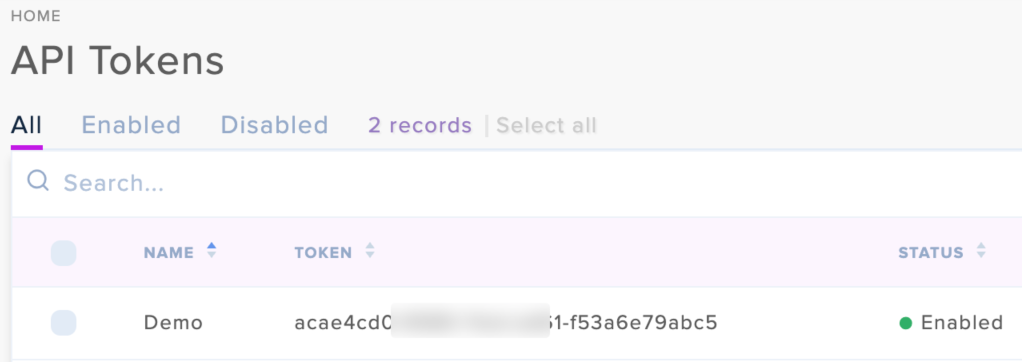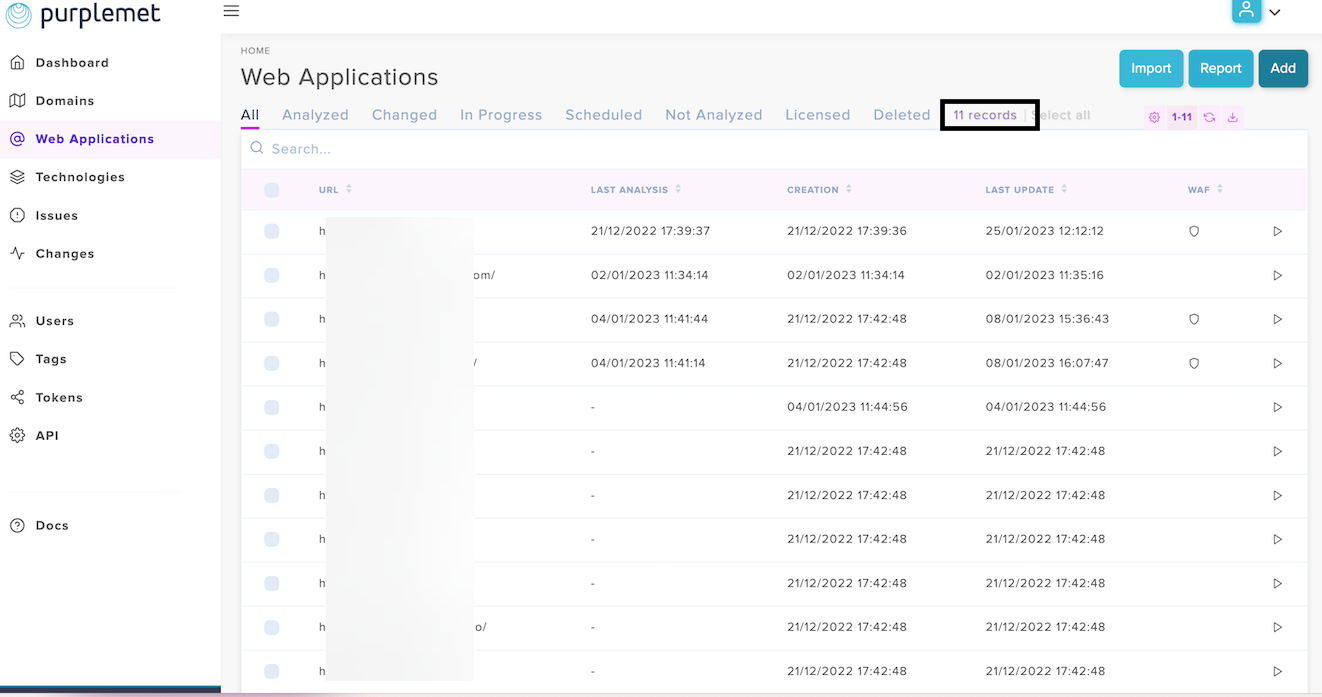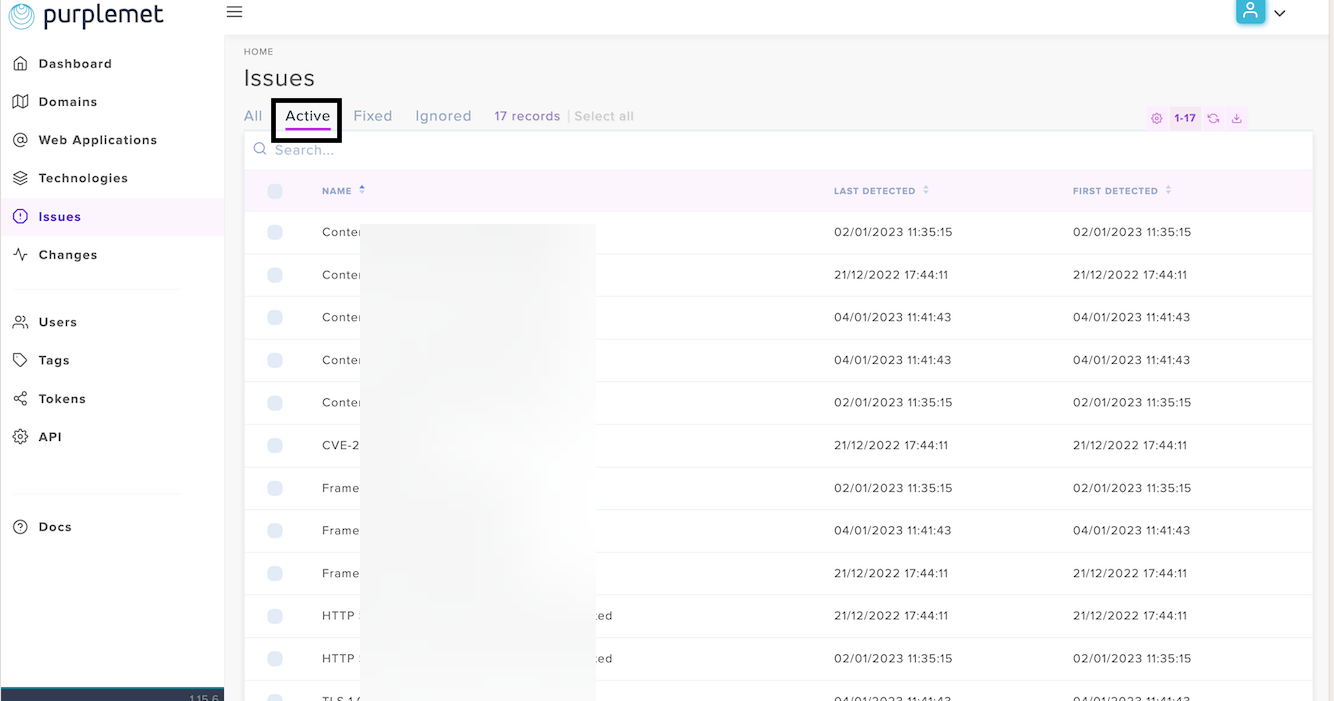Purplemet Connector
The following is not supported in Tenable FedRAMP Moderate environments. For more information, see the Tenable FedRAMP Product Offering.
The following steps allow you to configure this connector for use with Tenable Exposure Management from start to finish.
Connector Details
| Details | Description |
|---|---|
|
Supported products |
|
|
Category |
DAST |
|
Ingested data |
Assets and Findings |
|
Ingested Asset Classes |
Web Application |
|
Integration type |
UNI directional (data is transferred from the Connector to Tenable Exposure Management in one direction) |
|
Supported version and type |
SaaS (latest) |
Prerequisites and User Permissions
Before you begin configuring the connector, make sure to:
-
Confirm that your Purplemet subscription is active.
Generate a Purplemet API Key
-
Log in to the Purplemet platform.
-
In the left menu, click Tokens.
-
Click Add.
-
Type a Friendly Name (for example, ExposureManagementAPI) and enable the Activation toggle.
-
Click Generate.
-
Copy the API Key to a safe location. You need it to configure the connector.
-
In the upper-right corner, click Confirm.
-
Ensure the status of the generated API token is Enabled.
Add a Connector
To add a new connector:
-
In the left navigation menu, click Connectors.
The Connectors page appears.
-
In the upper-right corner, click
 Add new connector.
Add new connector.The Connector Library page appears.
-
In the search box, type the name of the connector.
-
On the tile for the connector, click Connect.
The connector configuration options appear.
Configure the Connector
To configure the connector:
-
(Optional) In the Connector's Name text box, type a descriptive name for the connector.
-
(Optional) To use a preconfigured on-prem connector to connect to this connector, from the Gateway drop-down, select the on-prem connector you want to use for the connector. Otherwise, select Don't use gateway.
Note: For information about configuring a gateway, see Tenable On-Prem Connector. -
In the API Key text box, paste the API key you generated in Purplemet.
-
In the Data pulling configuration section, you can configure dynamic settings specific to the connector.
-
In the Asset Retention text box, type the number of days after which you want assets to be removed from Tenable Exposure Management. If an asset has not been detected or updated within the specified number of days, it is automatically removed from the application, ensuring your asset inventory is current and relevant.
Tip: For more information, see Asset Retention. -
For the Immediately remove assets when their status is option, choose to automatically remove assets that reach a certain asset status, for example, terminated.
-
-
In the Test connectivity section, click the Test Connectivity button to verify that Tenable Exposure Management can connect to your connector instance.
-
A successful connectivity test confirms that the platform can connect to the connector instance. It does not, however, guarantee that the synchronization process will succeed, as additional syncing or processing issues may arise.
-
If the connectivity test fails, an error message with details about the issue appears. Click Show tests for more information about the exact error.
-
-
In the Connector scheduling section, configure the time and day(s) on which you want connector syncs to occur.
Tip: For more information, see Connector Scheduling. -
Click Create. Tenable Exposure Management begins syncing the connector. The sync can take some time to complete.
-
To confirm the sync is complete, do the following:
-
Navigate to the Connectors page and monitor the connector's status. Sync is complete once the connector status is Connected.
-
View the sync logs for the connector to monitor the logs for a successful connection.
-
Purplemet in Tenable Exposure Management
Locate Connector Assets in Tenable Exposure Management
As the connector discovers assets, Tenable Exposure Management ingests those devices for reporting.
To view assets by connector:
-
In Tenable Exposure Management, navigate to the Assets page.
-
In the Filters section, under 3rd Party Connectors, click the connector name for which you want to view assets.
The asset list updates to show only assets from the selected connector.
-
Click on any asset to view Asset Details.
Locate Connector Weaknesses in Tenable Exposure Management
As the connector discovers weaknesses, Tenable Exposure Management ingests those weaknesses for reporting.
To view weaknesses by connector:
-
In Tenable Exposure Management, navigate to the Weaknesses page.
-
In the Filters section, under 3rd Party Connectors, click the connector name for which you want to view weaknesses.
The weaknesses list updates to show only weaknesses from the selected connector.
-
Click on any weakness to view Weakness Details.
Locate Connector Findings in Tenable Exposure Management
As the connector discovers individual findings, Tenable Exposure Management ingests those findings for reporting.
To view findings by connector:
-
In Tenable Exposure Management, navigate to the Findings page.
-
In the Filters section, under 3rd Party Connectors, click the connector name for which you want to view findings
The findings list updates to show only assets from the selected connector.
-
Click on any asset to view Finding Details.
Data Mapping
Exposure Management integrates with the connector via API to retrieve relevant weakness and asset data, which is then mapped into the Exposure Management system. The following tables outline how fields and their values are mapped from the connector to Exposure Management.
Web Application Mapping
| Tenable Exposure Management Value |
Purplemet Value |
|---|---|
| Unique Identifier | Web application ID |
| Asset - Name | Web application URL |
| Asset - First Observation Date | createdAt |
| Asset - Last Observed At | lastAnalysisDate |
| Asset - Webapp Homepage Screenshot Url | Web application URL |
|
Asset - External Tags |
Tags |
| Asset Custom Attributes |
Web application ID IP address Number of technologies Rating notification enabled last analysis status last analysis mode last analysis user name |
Finding Mapping
| Tenable Exposure Management UI Field |
Purplemet Field |
|---|---|
| Unique Identifier | Issue name + Web application URL |
| Finding Name | Issue name |
| CVEs | CVEs |
| Severity Driver |
severity cvss3_scoring cvss3_severity |
| Description | data.description |
| First Seen | firstDetectedAt |
| Last seen (Observed) | lastDetectedAt |
| Finding Custom Attributes |
issue_type technology_name technology_version reference cwe_name severity score cvss3_vector Issue ID |
Finding Status Mapping
|
Tenable Exposure Management Status |
Purplemet Status |
|---|---|
|
Active |
Open Ignored |
|
Fixed |
Fixed |
Note:For Purplemet, Tenable uses the status field to determine status.
Finding Severity Mapping
|
Tenable Exposure Management Severity |
Purplemet Score |
|---|---|
|
Critical |
Severity: Critical |
|
High |
Severity: High |
|
Medium |
Severity: Medium |
|
Low |
Severity:Low |
Note:For Purplemet, Tenable uses the severity field to determine severity.
Status Update Mechanisms
Every day, Tenable Exposure Management syncs with the vendor's platform to receive updates on existing findings and assets and to retrieve new ones (if any were added).
The table below describes how the status update mechanism works in the connector for findings and assets ingested into Tenable Exposure Management.
|
Update Type in Tenable Exposure Management |
Mechanism (When?) |
|---|---|
|
Archiving Assets |
|
|
Change a Finding status from "Active" to "Fixed" |
|
Uniqueness Criteria
Tenable Exposure Management uses defined uniqueness criteria to determine whether an ingested asset or finding should be recognized as a distinct record. These criteria help define how assets and findings are identified and counted from each connector.
Tip: Read all about Third-Party Data Deduplication in Tenable Exposure Management
The uniqueness criteria for this connector are as follows:
|
Data |
Uniqueness Criteria |
|---|---|
|
Asset |
Web application ID |
|
Finding |
Issue name + Web application URL |
API Endpoints in Use
API version: v1.15.4
|
https://api.purplemet.com/site |
|
|
https://api.purplemet.com/site/tag |
|
|
https://api.purplemet.com/site/{tag_id}/site |
|
| https://api.purplemet.com/issue |
Findings |
Data Validation
This section shows how to validate and compare data between Tenable Exposure Management and the Purplemet platform.
Asset Data Validation
Objective: Ensure the number of web applications in Purplemet aligns with the assets displayed in Tenable Exposure Management.
In Purplemet:
-
Navigate to Web Applications from the left navigation menu.
-
Review the list of websites. This list represents all web applications discovered in the tenant.
In Tenable Exposure Management:
-
Compare the total number of assets between Purplemet and Tenable Exposure Management.
Expected outcome: The total numbers returned in Purplemet and Tenable Exposure Management should match.
If an asset is not visible in Tenable Exposure Management, check the following conditions:
-
Archived because it did not return in the connector's next sync.
Tip: To learn more on how assets and findings change status, see Purplemet Connector.
Finding Data Validation
Objective: Ensure the number of vulnerability instances in Purplemet aligns with the findings displayed in Tenable Exposure Management.
In Purplemet:
-
Navigate to Issues.
In Tenable Exposure Management:
-
Compare the total number of findings between Purplemet and Tenable Exposure Management.
Expected outcome: The total numbers returned in Purplemet and Tenable Exposure Management should match.
If a finding is missing from Tenable Exposure Management or no longer active, check the following conditions:
-
The finding is marked as Fixed and appears under the Fixed state on the Findings screen.
-
The finding no longer appears because its related asset was archived.
Tip: To learn more on how assets and findings are archived or change status, see Purplemet Connector.






